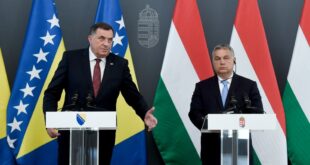The real reason behind a recent large-scale operation to shut down a radical Wahhabi village in Bosnia has more to do with an ongoing terrorism investigation than official statements about ethnic intolerance and territorial integrity, Anes Alic writes for ISN Security Watch.
In massive raid conducted by Bosnian police and security agencies last Tuesday in the remote northern Bosnian village of Gornja Maoca – home to followers of the radical Wahhabi Islam movement – the community’s leader and six others were arrested.
“The raid was carried out with the of aim of arresting individuals posing a security threat by undermining the territorial integrity and constitutional order [of Bosnia] and inciting ethnic, racial or religious hatred and intolerance,” Boris Grubesic, spokesman for the Bosnian State Prosecutor’s Office, told a press conference last week.
The enigmatically codenamed ‘Operation Light,’ included more than 600 police and security agents, and was the largest such operation since the end of the war in Bosnia 14 years ago. It is also unique in that police from both of Bosnia’s eternally quarreling entities – the Bosnian Serb-dominated Republika Srpska and the Bosniak- and Bosnian Croat-dominated Federation – took part, supported by the State Investigation and Protection Agency’s (SIPA), the Intelligence and Security Agency (OSA) and State Border Service (SBS).
Security forces blocked all entrances to the village, allowing no one to enter or leave. They also seized a large cache of weapons, ammunition, explosives, military uniforms, CDs and DVDs in Arabic, as well as a large amount of cash during the raid. Seven members of the local Wahhabi community, including one foreigner illegally living in the country, were arrested and will be held in custody for one month until official indictments are presented.
State within a state
The Gornja Maoca community was formed in 2002 by Bosnian and foreign followers of the Wahhabi movement. It is similar to a community in the central Bosnian village of Donja Bocinja, which was closed down in 2001 by local authorities under US pressure, with the Wahhabi followers forced to relocate, and Bosnian Serbs, who lived in the village before the war, were allowed to return to their homes.
The residents of Gornja Maoca, which comprise around 30 families, claim to be farmers subsisting largely on agriculture. They do not mix with people outside their community and do not have televisions or telephones.
The community abides by Sharia law, with all children attending an Arabic-language school operated in accordance with the Jordanian school system. All the street signs in the village are also in Arabic, and a new mosque was recently built for the village with donations from Saudi Arabia and Jordan, and is not under the control of the Bosnian Islamic community.
The leader of the community, who was arrested on Tuesday, is the 38-year-old self-proclaimed sheikh Nusret Imamovic, a teacher of Sharia law to some 30 students at the improvised Gornja Maoca school and a lecturer at the Saudi-funded King Fahd Mosque in Sarajevo.
Behind the raid
Speaking to ISN Security Watch on condition of anonymity, a source from the State Prosecutor’s Office said that though officials told local media that the raid was conducted largely because of threats to territorial integrity, ethnic intolerance and the operation of an illegal school system, the real reasons behind the raid had more to do with a terrorism case opened last year. Imamovic had been previously under investigation on suspicion of setting up and operating an illegal school in the village, but that investigation was halted due to lack of evidence.
Indeed, in a country where ethnic intolerance is widespread and territorial integrity is under constant threat, the fact that the authorities sent a 650-strong police force backed by 240 vehicles, including infantry fighting vehicles, to take on some 30 Wahhabis, should have alerted the media that there was more behind the raid than officials were letting on.
The State Prosecutor’s Office source told ISN Security Watch that some of those arrested during the Tuesday raid could be linked to ongoing terrorism proceedings, and that authorities are hoping to find evidence that here that radical forces in Austria are serving as the ideological and financial center for a Bosnian terrorist network.
“It is going to very difficult to charge some of the arrested with terrorism, and we might not [be successful]. However, it is a fact that most of the Gornja Maoca residents have been previously linked to terrorism cases, illegal possession of the weapons and other criminal activities. We are going to try to prove their international connections and relations to the Rustempasic brothers’ terrorism case, also with Austria connections,” the source said.
The source also stated that the raid was conducted on a large scale due to the complete isolation of Gornja Maoca and the authorities’ inability to collect information on activities there in advance. All previous attempts by authorities to enter the village ended in failure, including attacks on police officers.
For the past several years, Bosnian authorities have largely relied on foreign intelligence on the area, including information that radical Wahhabis were using the village as a terrorist training camp and a safe haven for wanted terrorist suspects and other criminals. From time to time, international media would report on the arrest of an Islamic militant who was said to have taken part in training in Gornja Maoca, but those reports were never independently confirmed.
In advance of the raid, Bosnian security agencies had observed, from a distance, meetings held in the village twice a year in which as many as 500 radical Muslims from Croatia, Slovenia, Germany, Austria and other countries took part. But the outcomes of the two-day meetings remained a mystery.
According to the Sarajevo-based weekly Slobodna Bosna magazine, Bosnian security agencies had originally planned to conduct the massive raid last summer, during a meeting that included some 300 participants. But due to a shortage of time to prepare the raid, a risk evaluation concluded that it should be postponed.
Again, the Vienna connection
The most prominent figure present at those meetings is former Bosnian Muslim cleric Muhamed Porca, who has served as the head of the Vienna-based Al-Tawhid Mosque since 1993. Bosnian intelligence believes he is the main source of financial and ideological support for the Bosnian Wahhabi movement.
“We believe that soon after the Donja Bocinja Wahhabi community was closed down […] Muhamed Porca organized and financed the creation of the [Gornja Maoca] Wahhabi community. The money used for buying houses and financing the Wahhabis’ relocation, Porca secured through the Saudi High Commission for Aid to Bosnia, of which he was representative in Vienna, and also from some Islamic charities based in the UK and Kuwait,” the State Prosecutor’s Office source said.
Last year, an ISN Security Watch source from the Federal Police (FUP) said that his forces had discovered, after a tip-off from Austrian security services, that the very first residents of the Gornja Maoca community had moved there from Vienna and had all been members of Porca’s mosque.
Another of Porca’s associates, the recently arrested Nusret Imamovic, entered the spotlight after the first leader of Gornja Maoca, Sabahudin Fiuljanin (also a holder of residence permit in Vienna) was arrested in Bosnia and Herzegovina in October 2002 by US forces, who followed him home after observing him outside a US military base in the city of Tuzla on several occasions.
In his apartment, soldiers found a shoulder-held rocket launcher and several different passports, along with a last will and testament. Fiuljanin was released in early 2003 under pressure from human rights groups who protested the suspect’s lack of rights to a lawyer while in detention. Since then he has lived in Sarajevo.
Fiuljanin was then replaced by Imamovic, a naturalized Austrian citizen who served as the local imam in the town of Kalesija and spent his time shuffling back and forth between Vienna and Gornja Maoca. Imamovic became better known to the Bosnian public when he and six other Wahhabis, three of them Austrian citizens, assaulted a Bosnian Serb near Gornja Maoca in 2006. After a short trial, the seven were given symbolic sentences and released on parole. Some of them returned to Vienna.
Imamovic also runs an extremist website putvjernika.com, which glorifies jihad and tabulates number of dead Americans in the war on terror. Imamovic has previously attracted public attention by his statement on the website that suicide attacks are not forbidden by Islam, and that they should be used in “exceptional circumstances.”
Last year, SIPA opened an investigation into the website, suspecting it is serving as a recruitment point for Bosnian Wahhabis to fight against US-led coalition forces in Iraq and Afghanistan, through the distribution of propaganda material.
Previously, ISN Security Watch’s source from SIPA said that the website was being run from Austria, and that for some time, due to its content, had been shut down by Austrian authorities. However, it was recently relaunched.
Also among the arrested is Safet Barcic, allegedly Imamovic’s deputy, the brother of late Jusuf Barcic, a former Wahhabi leader and Vienna-based cleric, who is also a close associate of Porca.
Source: isn.ethz.ch
 Eurasia Press & News
Eurasia Press & News



